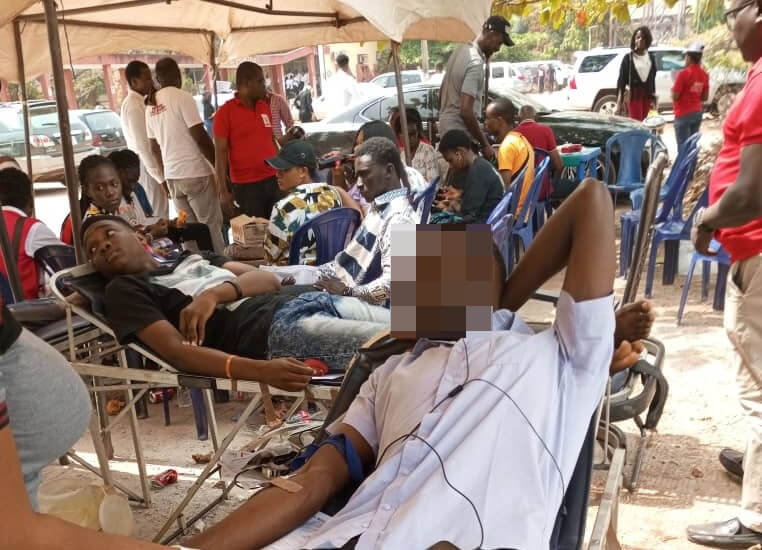On Tuesday, February 14, 2023, Nigeria’s National Blood Service Commission or NBSC took its campaign for voluntary blood donation to the Nnamdi Azikiwe University, Awka, Anambra State.
Some of the school’s students had the chance for the first time to donate blood for use at health facilities across the country.
After being educated on the importance of blood donation, James Chidera Wisdom, a 23-year-old student, submitted himself as a first-time blood donor.
“I feel good, so happy. The most important thing is that everybody should have the opportunity to live. If it is just blood that will make anyone die, why not donate it and save such a life?” he said.
Because postpartum haemorrhage (a woman bleeding heavily shortly after childbirth) is a leading cause of maternal mortality in Nigeria, plus the country has the highest global burden of sickle cell disease affecting 2-3% of the population, coupled with high road traffic injury rates, the demand for blood donation remains high in Nigeria.
The country needs 1.8 million units of national blood annually to meet this demand. And since an individual is medically recommended to donate only one pint per time, Nigeria needs 10 donations per 1000 population every year. But unfortunately, only about 25,000 to 60,000 units of blood are collected annually in the country.
“In our hospitals, you see several people in urgent need of blood – pregnant women, accident victims and sickle cell anaemia patients,” said Patrick Mbanefo, leader of NBSC’s team to the Nnamdi Azikiwe University, told Prime Progress.
Many people hesitate to donate blood here, pegging their reluctance on religious beliefs, superstitions, and poor living standards. In the end, there is always a blood shortage at the National Blood Service Commission (NBSC), the agency catering to the country’s blood needs.
Until February 14, celebrated worldwide as a day of love (Saint Valentine’s Day), Wisdom was one of the citizens reluctant to donate blood. But thanks to the team from the NBSC for showing him and other students that donating blood is showing love and saving a life.
“Going to the hospitals and watching people need blood, I was inspired to start saving lives through this donation. I advise others to donate their blood, especially when you have been certified safe,” he said.
Like Wisdom, 21-year-old Raphael Anadebe is another first-time donor.
“I just donated my blood to save lives,” he said joyfully. “Thousands of lives in hospitals across the country are in dire need of blood.”
Meanwhile, only about 5% of donor blood used in Nigeria come from voluntary donors; family and paid donors remain the primary sources of blood procurement.
The low level of voluntary blood donation means most hospitals rely on paid blood vendors to meet the blood transfusion needs of local communities. This has sparked the need for the NBSC to bring blood donation campaigns to universities and other public places.
“It is about educating the entire institution’s students to donate blood voluntarily. The Students Union Government and Rotaract Club partner with us and do the canvassing and the awareness creation among fellow students,” Mbanefo said.
“We don’t endanger people’s lives. Before we take blood from any prospective donor, we must check the blood percentage (haemoglobin) to determine their eligibility. We take the blood when we ascertain that he has excess blood.”
Maduabuchi Anozie, the spokesperson of the commission, southeast zone, shed further light on the importance of donating blood.
“You are giving out your blood to save the next person you don’t know, and it may end up being someone close to you. The donors are not paid; however, we give them little refreshments. We run some tests on them free of charge. They include HIV 1 and 2, hepatitis B and C., the presence of syphilis and their blood group,” he said.






